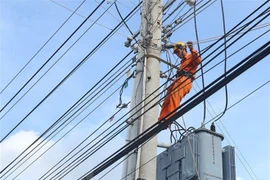At a meeting to review the group’s performancein Hanoi on January 3, Anh said the power volume produced and purchased lastyear reached 212.9 billion kWh, up 2.4 billion kWh from the target set and10.36 percent from 2017.
These figures have helped Vietnam’s GettingElectricity (GE) indicator jump 37 places to 27th among the 190 economieslisted in the World Bank’s Doing Business 2019 report.
EVN was rated BB by Fitch Ratings last year, theexecutive said, adding that this positive credit rating can help the firmattract investment and power projects.
Additionally, the EVN was named among thesustainable Vietnamese enterprises in 2018 by the Vietnam Business Council forSustainable Development, and one of the leading state-owned firms in terms ofinformation transparency by the non-profit consulting company TowardsTransparency.
Anh reported on the profitable production andbusiness activities for the group last year, elaborating that it gained 340.5trillion VND (14.6 billion USD) in total revenue, up 15 percent from 2017. Thisincluded nearly 333 trillion VND in electricity sales, up 14.6 percent.
The power supply reliability has also beenimproved as the System Average Interruption Duration Index (SAIDI) fell 30percent from the previous year to 723 minutes. The SAIDI of EVN’s subsidiariesdeclined by 18-39.5 percent.
Meanwhile, the rate of power loss for the wholebusiness is estimated at 6.9 percent, reaching the target set by the Governmentone year ahead of schedule.
Addressing the meeting, Deputy Prime MinisterTrinh Dinh Dung said that the electricity sector is facing the risk of a powershortage as the demand for power is growing fast – rising by upwards of 10percent each year, exceeding the sector’s supply capacity.
Therefore, the sector needs to makebreakthroughs in electricity infrastructure development, he said, asking theEVN to improve its operation effectiveness to reduce power prices, reorganiseits apparatus, improve service quality, and ensure environmental protection ismaintained at thermal power plants.
The year ahead is predicted to be a difficultone for EVN. However, the group still targets a 9.2-percent increase to hit 232.5billion kWh in the electricity produced and purchased in 2019 so as to preparefor higher demand.
It also aims to reduce the SAIDI to 400 minutesand the power loss rate to 6.7 percent next year, Anh said.–VNA





























